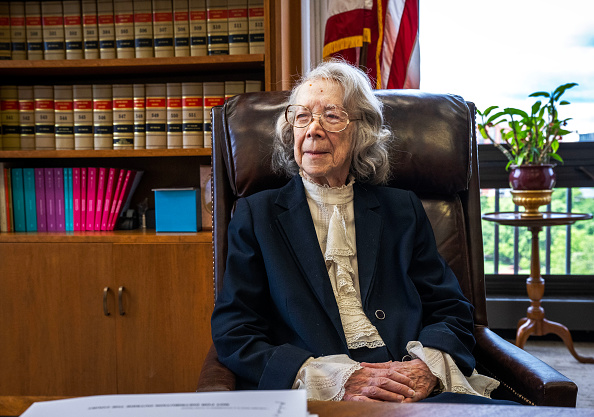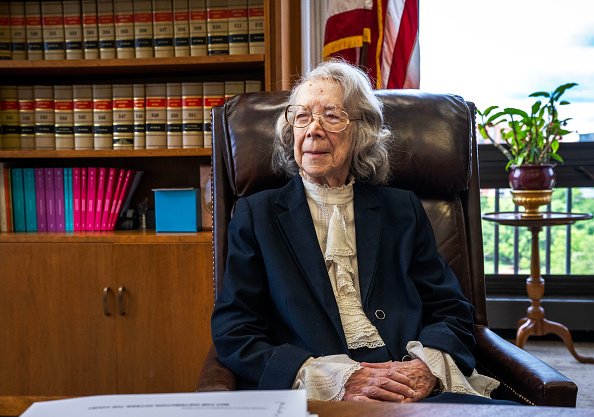Judiciary
DC Circuit cites ‘constitutional concerns’ even as it rejects challenge to suspension of federal appeals judge who’s 98

Judge Pauline Newman, now age 98, of the U.S. Court of Appeals for the Federal Circuit in May 2023. (Photo by Bill O’Leary/The Washington Post via Getty Images)
The U.S. Court of Appeals for the District of Columbia Circuit ruled Friday that it does not have jurisdiction to review the bulk of Judge Pauline Newman’s challenge to her suspension, saying it was bound by 2001 precedent that it cannot overrule.
The appeals court said the only argument that it could consider was that the statute on judicial suspensions for disability was unconstitutional on its face, and that argument failed because Newman of the U.S. Court of Appeals for the Federal Circuit agrees that the law is constitutional in some applications.
Other challenges by Newman are barred by a 2001 D.C. Circuit decision holding that the U.S. Judicial Conference is the exclusive body that can review statutory and as-applied constitutional challenges to judicial council orders, the D.C. Circuit said.
The D.C. Circuit questioned the 2001 precedent and appeared to invite further review, according to experts who spoke with Law360 and Paul Cassell, a professor at the University of Utah S.J. Quinney College of Law, who wrote about the case at the Volokh Conspiracy.
The decision “is about as clear an invitation by a panel to the losing side to file a petition for rehearing en banc as I’ve ever seen,” said Arthur Hellman, a professor at the University of Pittsburgh School of Law, in an interview with Law360.
Newman, 98, is a judge for the Federal Circuit. The Federal Circuit’s judicial council has suspended Newman from hearing new cases since 2023 because she refused to submit to medical evaluations to probe allegations that she suffered from memory loss and confusion.
Newman’s lawsuit challenged the Judicial Conduct and Disability Act, which authorizes judicial councils made up of fellow judges to investigate allegations of disability against federal judges. She argued that a statutory provision authorizing temporary suspensions is facially unconstitutional, that the same provision is unconstitutional as applied to her because she was effectively removed without impeachment, and that the judicial council exceeded its statutory authority because her suspension is not temporary. She also claimed that her due process rights were violated because her case was not transferred to another district.
The precedent binding the D.C. Circuit panel is McBryde v. Committee to Review Circuit Council Conduct & Disability Orders of the Judicial Conference of the United States.
“Judge Newman cannot show that McBryde has been eviscerated or that her specific claims escape its grasp,” the D.C. Circuit said. “We thus lack jurisdiction over her statutory and as-applied constitutional challenges.”
The D.C. Circuit said its decision against Newman is unrelated to the strength of her claims and does not reflect its views on the underlying dispute.
According to the D.C. Circuit, the McBryde decision may suggest that no forum is available to decide Newman’s claims if the Judicial Conference declines consideration. And giving the Judicial Conference the power to decide would mean that the conference, rather than the U.S. Supreme Court, would have “the last word on major questions of constitutional law.”
“The seeming absence of a judicial forum to address Newman’s as-applied constitutional claims itself raises constitutional concerns,” the appeals courts said. Newman presents “substantial arguments” that her suspension “threatens the principle of judicial independence and may violate the separation of powers. She further contends that the refusal to transfer her case to a different circuit deprived her of an impartial tribunal, which if correct would raise due process concerns. … Those doubts, however, would at most suggest that McBryde was wrong the day it was decided, not that it does not bind us now.”
Because Newman’s claims can’t be heard “in any Article III forum,” the appeals court said. it is “up to the judicial council and the Judicial Conference to genuinely engage with those arguments.”
Cassell, who signed an amicus brief urging review of Newman’s claims on the merits, said the opinion suggests “some possible new judicial avenues Judge Newman might consider,” including en banc review by the D.C. Circuit and the possibility of mandamus review by the Supreme Court.
A lawyer for Newman, John J. Vecchione of the New Civil Liberties Alliance, a nonprofit public interest law firm, told Law360 that he thinks that the D.C. Circuit provides “a road map.”
“I assure you we will be moving forward. I just can’t tell you with exactly what procedure yet,” he said.
Write a letter to the editor, share a story tip or update, or report an error.

